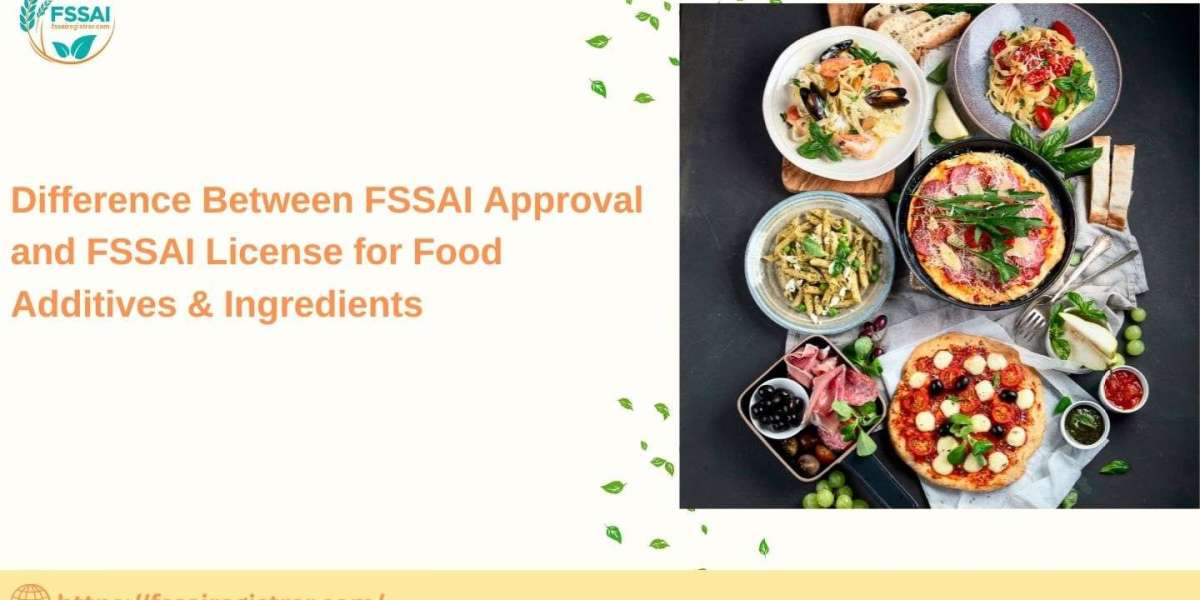In India’s growing food industry, ensuring compliance with the Food Safety and Standards Authority of India (FSSAI) is not just a legal requirement but also a foundation for consumer trust. Every food business, whether it deals with packaged snacks, health supplements, or beverages, must understand the difference between FSSAI approval and FSSAI license, especially when working with food additives and ingredients.
Food safety compliance can often confuse entrepreneurs and startups. While some think an FSSAI license is enough, others confuse it with approval requirements. In reality, both serve different purposes. A food business using regular ingredients listed in the FSSAI regulations needs only a license. However, if you want to introduce a new ingredient, additive, or formulation not covered under existing rules, you will require FSSAI approval before using it commercially.
In this blog, we will explore the differences in detail, their importance, and the process for each.
What is FSSAI License?
An FSSAI license is an official authorization granted by the Food Safety and Standards Authority of India (FSSAI) that allows food-related businesses to legally operate in the country. Whether you are manufacturing, processing, packaging, storing, distributing, or selling food products, having this license ensures that your business complies with national food safety laws. It acts as proof that your company is committed to maintaining hygiene, quality, and consumer safety.
In simple terms, no food business can run legally in India without an FSSAI license. It builds customer trust, prevents legal troubles, and makes your brand more credible in the market.
Types of FSSAI Licenses:
- Basic License – Designed for small-scale food businesses such as small shops, petty retailers, or home-based food ventures with an annual turnover of up to ₹12 lakhs.
- State License – For medium-sized businesses operating within a single state, such as restaurants, mid-sized manufacturers, or storage units, with a turnover between ₹12 lakhs and ₹20 crores.
- Central License – For large-scale operations, importers/exporters, or businesses with turnover above ₹20 crores. It is also mandatory for companies that supply food products to government offices or across multiple states.
What is FSSAI Approval?
While an FSSAI license permits a business to operate legally, there are cases where a company might want to introduce a new food ingredient, additive, or formulation that isn’t yet covered under FSSAI’s existing regulations. This is where FSSAI approval comes in.
For example, if a food manufacturer wants to use a new artificial sweetener, a unique flavoring agent, a nutrient blend, or a preservative that is not already listed under FSSAI’s permissible ingredients, they cannot simply add it to their products—even if they have a license. Instead, they must apply for prior approval from FSSAI.
This approval ensures that any new or innovative ingredient introduced in the Indian food market is safe for consumption and backed by scientific evaluation. It acts as an additional layer of protection for consumers while also giving food businesses the opportunity to innovate responsibly.
When is FSSAI Approval Needed?
Getting an FSSAI license alone is not always enough for food businesses. In certain situations, you also need FSSAI approval before launching or selling a product. Approval is mandatory whenever a business is dealing with new food items, ingredients, or additives that are not yet covered under existing FSSAI regulations.
Some common cases where approval is needed include:
- For novel foods or ingredients not used traditionally in India
If a company wants to introduce a food item or ingredient that has not been a part of Indian diets before (for example, quinoa-based snacks years ago), they must first seek approval. This ensures that the new food is tested for safety before reaching consumers. - For new food additives or preservatives not in FSSAI’s permitted list
Businesses often use additives like colors, flavors, and preservatives. If the additive they want to use is not already listed by FSSAI, they need prior approval to make sure it won’t harm public health. - For health supplements or nutraceuticals containing new formulations
Many companies in the wellness and fitness industry bring new dietary supplements or protein mixes. If the formula includes ingredients or nutrient levels not recognized by FSSAI, the product cannot be sold without approval. - For imported food ingredients not yet recognized by FSSAI
Sometimes businesses import foreign food ingredients, such as new sweeteners, flavors, or fortified products. If these are not yet studied or permitted by FSSAI, businesses must get approval before selling them in India.
Process of Obtaining Each
FSSAI License Process
To simplify the process, visit fssairegistrar.com. It will redirect you to the official FoSCoS portal where you can complete your registration smoothly.
Steps include:
- Register on FoSCoS.
- Choose the correct license category (Basic, State, Central).
- Submit necessary documents (e.g., incorporation certificate, food safety plan, ID proofs).
- Pay fees based on turnover.
- Receive license with 1–5 years validity.
FSSAI Approval Process
- Submit a product or additive-specific approval application.
- Provide scientific data, lab test reports, safety studies.
- Undergo technical evaluation by FSSAI’s expert panel.
- Once approved, the additive/ingredient can be legally used in manufacturing.
Why This Distinction Is Important for Food Businesses
- Compliance: Avoid penalties, recalls, or legal issues by following correct procedures.
- Market Readiness: Device proper processes for safe product launches with innovation-driven compliance.
- Trust & Credibility: Approved products enhance brand reputation and consumer confidence.
- Regulatory Readiness: Aligns your business for inspection and audit readiness across operations.
- Expansion Friendly: Compliance opens doors to partnerships, retail outlets, and export opportunities.
Conclusion
To thrive in India’s food business ecosystem:
- FSSAI License: A fundamental requirement for operating legally with standard ingredients.
- FSSAI Approval: A crucial certification for innovation—necessary for ingredients not currently approved by FSSAI.
Understanding and applying for both appropriately ensures your business stays compliant, safe, and poised for success.
Note: To kickstart or streamline your FSSAI License or Approval process, visit fssairegistrar.com.



